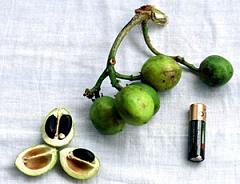While much of the talk regarding biodiesel these days has been about mega-refineries that try to keep up with the growing demand for the green fuel, there was some recent “small” talk about the biofuel… in fact, microscopic talk.
 This story in the Fort Worth (TX) Business Press says at the recent conference on nanotechnology, NanoTx 2007, in Dallas, scientists discussed how to apply the control of matter on the molecular level to biodiesel production:
This story in the Fort Worth (TX) Business Press says at the recent conference on nanotechnology, NanoTx 2007, in Dallas, scientists discussed how to apply the control of matter on the molecular level to biodiesel production:
Last year, researchers at UT Arlington’s college of engineering developed a microreactor that could dramatically reduce the time and cost needed to process biodiesel fuel.
“We are actively seeking companies that build biodiesel refineries to be our partners in this nanotechnology development effort,” said Dr. Richard Billo, associate dean of engineering at the school. “The microreactor can take what is now a 90-minute process to convert vegetable oil to biodiesel fuel and reduce it to less than four minutes, even down to as little as six seconds, depending on some beginning variables,” he said.
The energy segment of the conference (pictured at right) was reported to be very popular as the scientists also talked about how to recapture heat produced from engines.


 Thanks, in part, to a $677,000 grant from the U.S. government, a program to plant jatropha trees to use as a feedstock for biodiesel in Hawaii will soon get underway.
Thanks, in part, to a $677,000 grant from the U.S. government, a program to plant jatropha trees to use as a feedstock for biodiesel in Hawaii will soon get underway.
 Aspen, Colorado has been a favorite destination for many in the jet-set for some time, but all those jets are not good for the mountain resort area’s environment. Airport officials, knowing they can’t do much right now about the planes’ pollution, are making moves to offset as much of the carbon footprint as possible.
Aspen, Colorado has been a favorite destination for many in the jet-set for some time, but all those jets are not good for the mountain resort area’s environment. Airport officials, knowing they can’t do much right now about the planes’ pollution, are making moves to offset as much of the carbon footprint as possible. The Children’s Museum of Atlanta’s motto is “Imagine It!” Well, now schoolchildren can expand those imaginations, thanks to a biodiesel-powered bus donated by a couple of benefactors.
The Children’s Museum of Atlanta’s motto is “Imagine It!” Well, now schoolchildren can expand those imaginations, thanks to a biodiesel-powered bus donated by a couple of benefactors. According to the cooperative agreement, phase one of the project will last approximately 20 months. A subsequent phase two agreement will then be negotiated to cover construction which is expected to take two years. Following construction, facility operation is expected to begin in 2011.
According to the cooperative agreement, phase one of the project will last approximately 20 months. A subsequent phase two agreement will then be negotiated to cover construction which is expected to take two years. Following construction, facility operation is expected to begin in 2011. The board of directors for the
The board of directors for the  During a meeting this week in Washington, DC the RFA board honored Ron Miller for his service as chairman of the RFA. Aventine is one of the oldest members of the RFA and Miller has held the position of chairman on three different occasions, most recently from 2005-2007.
During a meeting this week in Washington, DC the RFA board honored Ron Miller for his service as chairman of the RFA. Aventine is one of the oldest members of the RFA and Miller has held the position of chairman on three different occasions, most recently from 2005-2007.  Sen. Max Baucus, from Montana has taken the wraps off a tax package that is designed to help biodiesel and ethanol.
Sen. Max Baucus, from Montana has taken the wraps off a tax package that is designed to help biodiesel and ethanol. Gotfried said GreenFuel Technologies contacted the power company because it wanted to test the experiment in a real-world setting.
Gotfried said GreenFuel Technologies contacted the power company because it wanted to test the experiment in a real-world setting.